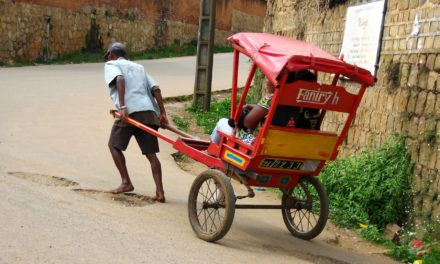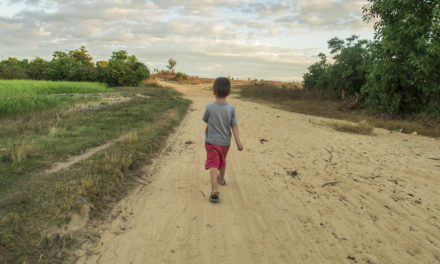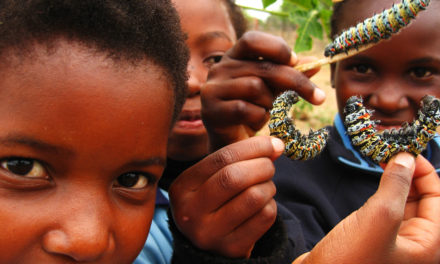W e live surrounded by two worlds, the inner and the outer.
In our inner world, inside our home, it’s bright with a skylight and there’s electricity (as long as the sun keeps shining) and bright light bulbs to see by in the evening. There’s a fair stock of a decent variety of foods including many prized items sent from as far off as the US. There’s a small gas stove that makes boiling water or cooking food as simple as flipping a switch and lighting a match. We have enough different spices and sauces that we can adjust the flavors of our food to suit our tastes. There are chairs to sit on, a table to eat at, beds to sleep in, and even a couch to relax on. We have a computer that we can use for work or entertainment. Everything inside our house is arranged just the way we like it; all of our stuff is in its own place. A cool breeze often blows through our home, much better than outside in the sun. Most of all, English is spoken inside our home, in our inner world… there’s not much struggling to make sense of it; we understand innately.
In the outer world, it’s often hot, there’s a limited amount of shade and rarely anywhere to sit. Goats and cows and chickens roam by, destroying anything trying to grow, knocking down clotheslines, making a mess. There’s bits and pieces of trash scattered around every village. The “bush” (i.e., the scraggly forest) is full of stickers that scratch your legs and tear your clothes when walking from one place to another.
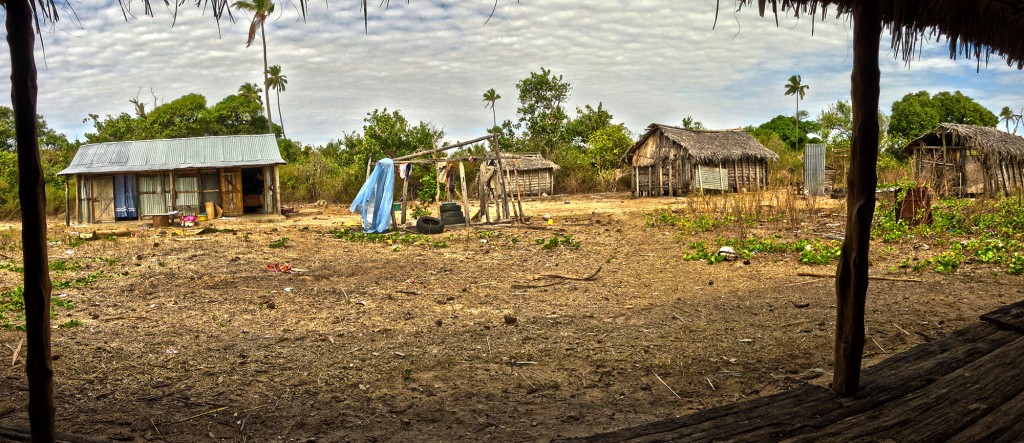
The view from the front door of our house, looking out into our tiny village. The royal home is on the left.
But what really makes the outer world distinct is the people who live in it. The Antakarana people, speaking a foreign language, telling convoluted stories about stolen fish; no matter how many new words we learn, the way they put them together just doesn’t make sense. And why tell that story in the first place? Their homes are small and dark and often falling apart. They chop wood every day to cook their food: mostly just dried small bony fish with steamed rice or boiled roots dug up from the forest. Their customs and rituals are strange, their taboos are everywhere and they seem to change every day. Supposedly this outer world is full of invisible ancestors keeping a close watch on everyone, making sure everything is arranged and organized just so and that no one steps out of line or violates a holy place… or else will face their wrath. There’s talk of other spirits out there too, but mostly just mumbles and rumors; I’m not really even sure.
Our inner world is peaceful, comfortable, and easy to understand. The outer world is foreign, strange, and full of unknown dangers invisible to the human eye. The only barrier between the two worlds is a couple doors and a few windows. There aren’t even any fences around our “yard” (or anyone’s house for that matter). Our front and back porch don’t even count as part of our inner world because Antakarana passersby often sit and gather there whether we’re in our home or not, as if it has nothing to do with us. The separation between all that we know and all that we don’t is very thin and precarious indeed.
You can imagine how tempting it often is to stay inside our comfortable, understandable inner world, keeping the doors and windows shut between us and all the uncomfortable foreignness outside. I think probably every missionary and expat worker has felt that temptation and a good many of them have given in. Of course, in places where privacy fences are common and neighbors rarely roam by, especially if any sort of climate control is available, it’s easy to stay locked inside, alone and isolated but comfortable, and there are few in the outer world who would even notice. Even for us, especially on a nice cool day when we don’t need the windows open to feel a breeze, we’ve sometimes made the decision to stay inside our comfortable unchallenging inner world and to maintain all the barriers between us and the outer world.
But in the long run, that doesn’t really work. Once in a while that separation may not make a difference, but over time that continual isolation incapacitates the one who refuses to encounter the outer world. Everything outside remains forever “unknown”. That which is unknown is almost always feared, and that encourages further separation and more withdrawal from the outside world. It continues in a downward spiral of self-centeredness and anxiety, resulting in shame, self-pity, or blind pride. And that’s just what happens inside the person; clearly that person is also ineffective towards whatever outward goal brought them to that foreign country in the first place.
S o from the beginning we’ve made the conscious decision to keep our doors open. Every day from the time we wake up until a couple hours past sundown, both our doors and all of our windows stay open. Our doors and windows only close when all of us leave our house and our village to go somewhere else. We’ve chosen to remove the barriers and expose our comfortable and understandable inner world to all of the uncomfortable foreignness outside it. We move from inside to outside frequently, and the outside foreignness also moves inside our home. Our remaining boundaries between the inner and outer worlds are very few and those boundaries only exist inside our heads.
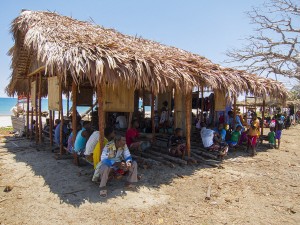
Our home completely exposed! Before it was finished being built, there was a big ancestral ritual in our village, and we allowed the many visitors to gather and sleep under the roof of our unfinished house. Sometimes our ‘open door’ policy means it still feels just like it looks in this picture!
This is a very big risk that we’re taking! When two foreign entities come into contact with one another, there’s sure to be misunderstandings, in language foremost, but also in way of thinking and decision-making and every area of life. Misunderstandings often enough result in hurt feelings or even other more tangible damage. To expose our only physical refuge to those likely possibilities basically means that if things go badly, we have nowhere left to retreat to, unless we leave altogether and call it quits. To explain it with a popular poker analogy: we went all in before the cards were even dealt. It’s a big risk!
But this is an intentional decision that we’ve made to know and to embrace the people around us, no matter what it turns out to look like and no matter how much it could hurt along the way. From the beginning we’ve exposed ourselves, even our inner lives, to people we’ve only just met. We’re allowing ourselves to be affected by them, and maybe to affect them with our lives as well.

The king doesn’t just come over looking for good food from us; he also shares his fish with us when he has a nice catch. This was a surprisingly large one he caught right off the beach one night!
If we go back to the poker analogy, I can say that the first few cards dealt to us weren’t looking very good. Of course it was too late to fold, so we held on; we kept our doors open. Slowly but surely we’ve come to understand the Antakarana dialect of the Malagasy language more and more. We’ve begun to understand their way of life and to find our place within it as well. Step by step (with some backsteps along the way), we’ve built good relationships with the people around us, the same people who initially didn’t seem interested in knowing us at all, or in letting us know them. All day long our doors are open and people often stop by to chat. The king (our closest neighbor) feels right at home and regularly just walks into our house unannounced and plops down on our couch, especially if it’s close to mealtime and he’s hoping for some tasty food. Kids come and go throughout the day between the rest of the village and Matimu’s room, and so do Matimu’s toys. We’ve kept the door open and our inner world and outer world don’t seem quite as different anymore; too much has already passed both ways.
R ecently we learned that every year around June and July, the Antakarana people have a time when the “doors are closed” to their ancestors. The people talk about it as if it’s something they can physically see. The way they describe it is so concrete and matter-of-fact, that at first I wondered if there was a royal ancestral tomb somewhere or something else where there are doors that are literally closed. Apparently there isn’t anything like that, yet when they speak of it, the distinct barrier between the Antakarana and their link to the spiritual realm is just as solidly defined as if there were something you could put your fingers on.

A “bouquet” tied to the main roof beam of a new house being built, to prevent curses from the ancestors regarding the new home.
During this time of the “doors being closed”, the Antakarana can’t build new homes (which require an appeasement of the ancestors before being begun), they can’t offer sacrifices to alleviate spirit possessions (which are often signaled by significant illness), and they don’t expect to receive any sort of blessings from their ancestors. As far as I can tell, everything between them and their ancestors (except for the taboos which must always be obeyed) is just completely cut off for a couple of months.
As hard as all of this is to understand, it may be similar to the time when the nation of Israel entered into the Temple every day, day after day, year after year, to offer sacrifices and maintain the good standing of the relationship between themselves and God. Then imagine that being cut off from them for a couple months every year.
What would it be like to feel that distinct separation and isolation from the “powers that be”? To believe you’re floating helplessly adrift amidst volatile spiritual forces and beings with no recourse, no line of communication, with any that you believe is on your side and who may help you out when you need it? Or, to take a possible analogy from our regular transport methods: what would it be like to be stranded at sea with no GPS or compass or other direction, no motor or other force, and no SOS signal or any way to attract the attention of someone who might help – to know ahead of time that you’ll be stranded for at least a couple of months? It must be terrible.
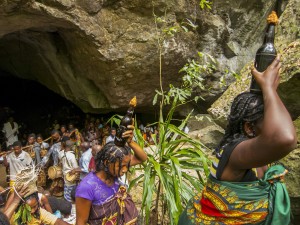
Antakarana people presenting offerings to their ancestors at the royal cave, during the time the “doors are open.”
The Antakarana ancestors can’t always be counted on to be benevolent even with the best communication and the most elaborate sacrifices. But there must be some comfort for the people in knowing they can at least try to appease them. But when the “doors are closed”, there’s no trying, there’s no new work that can be begun, there’s no solution for lingering problems no matter how terrible; there’s just a solid distinct barrier that can’t be removed for a couple of months. It’s inevitable and it’s unchanging; people accept it and they wait out those months mostly just sitting around in their villages, not doing much of anything. When the time is finished, there’s a big ritual on the mainland with sacrifices and rejoicing that the “door is opened” again and new works resume. Life returns to normal.
T he “closed door” and the “open door” for the Antakarana ancestors is something we’ve only recently learned about. But I can’t help but wonder if there might be some future connection between our literal “open door” policy, and the good news we’re bringing of the God whose doors are never closed, day or night, good times or bad, in season or out of season.
Right now it must be simply a strange occurrence to those here on Nosy Mitsio: the foreigners that have come to live among them, to live with them, and who keep their doors open throughout the day just like pretty much everyone else here. But just like Jesus showed us who God is, not only through his teachings but also through the small and big actions of his everyday life, we intend our lives to also be a reflection of him. So that when the time for teaching begins, our friends and neighbors here will have already seen its truth, its underlying reality, as exhibited in our lives. Jesus himself is God’s open door; through his work there now remain no boundaries between heaven and earth, for all those who would choose to enter in. God’s inner life has now come out to our outer world.
To “open our doors” (both literally and figuratively) is a decision we have to make every day when we wake up, and one we have to maintain all throughout the day, every day. It’s not normal for us Americans who love our privacy and our interior spaces, a place that’s “ours” and ours alone. It’s tough! But to do something as difficult as reaching the Antakarana, a people still far removed from the good news of our Creator God’s grace and love (or even to do something as difficult as reaching your co-workers or next-door neighbors back in the USA), it takes strong intentional action and persistent effort to maintain it. Even something seemingly small like opening our door, day after day, may communicate a message much greater than it appears.
Not only does our God never close the door, but we see in Jesus that he even leaves his own home and he comes up to our porch and he knocks when our doors are closed… that if we just open it up a crack, we may know Love and Life at last, and invite him to come in and live with us.
In Christ,
Adam, Lora, and Matimu
P.S. I wrote a lot with the analogy of our home and the outside world. If you haven’t yet seen the video with a walkthrough of our house and its construction process, you can get a picture of how we live here on Nosy Mitsio by watching our video here:



